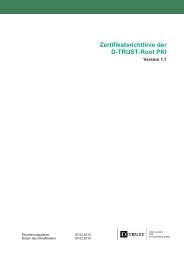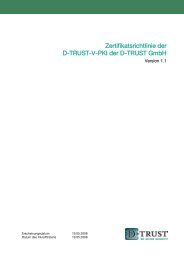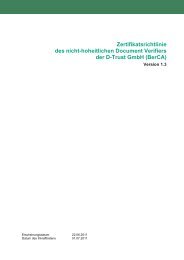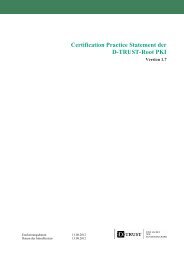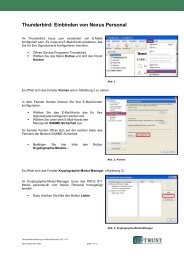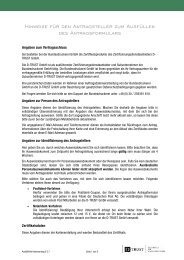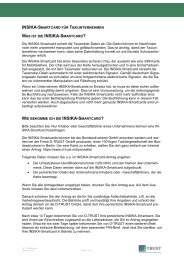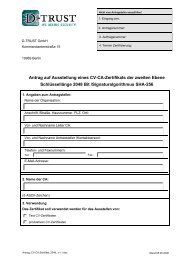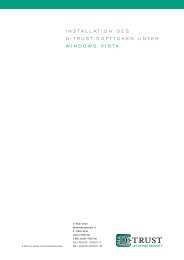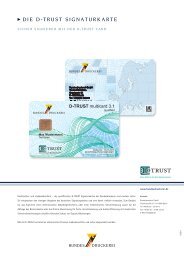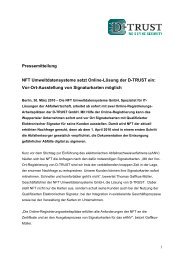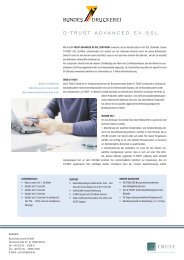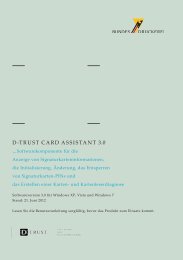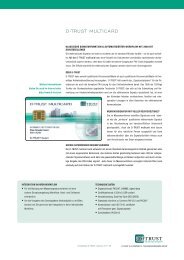D-TRUST-Root PKI Certification Practice Statement
D-TRUST-Root PKI Certification Practice Statement
D-TRUST-Root PKI Certification Practice Statement
Create successful ePaper yourself
Turn your PDF publications into a flip-book with our unique Google optimized e-Paper software.
D-<strong>TRUST</strong>-<strong>Root</strong>-<strong>PKI</strong> <strong>Certification</strong> <strong>Practice</strong> <strong>Statement</strong><br />
4.9 Revocation and Suspension of Certificates<br />
4.9.1 Criteria for Revocation<br />
A certificate is revoked in the following circumstances:<br />
- upon request of the subscriber or possibly affected third parties (for example an<br />
organization that is named in the certificate),<br />
- invalidity of data included in the certificate,<br />
- if the CSP ceases its operations and no other CSP continues the duties.<br />
- only code-signing certificates:<br />
• if the CSP becomes aware of the fact, that the certificate has been issued<br />
to a publisher of malware or<br />
• if the CSP becomes aware of the fact, that the certificate would damage<br />
the CSP’s reputation if it remained valid<br />
Apart from that, the CSP can arrange a revocation if:<br />
- the private key of the issuing CA or of a higher CA is compromised,<br />
- the key-pair is stored on a SmartCard which also holds the key-pair of a revoked<br />
qualified certificate,<br />
- weaknesses of the used cryptographic algorithms become known that endanger the<br />
allowed applications during the validity-period of the certificate,<br />
- the deployed hard- or software exhibits defects that endanger the allowed applications<br />
during the validity-period of the certificate,<br />
- the unambiguous assignment of the key-pair to the subscriber is no longer possible,<br />
- a certificate was obtained through the declaration of false data,<br />
- the customer is in arrear after two requests for payment,<br />
- the contractual relationship is cancelled or ends.<br />
Class 3 EV-certificates<br />
[GL-BRO] describes mandatory revocation reasons for EV-certificates (Annex A).<br />
The CSP hosts the EV-reporting office according to section 11.3 [GL-BRO], where<br />
<strong>PKI</strong>-participants or software producers may report complaints 24/7, remark their<br />
suspicions about the compromise of EV-certificate private keys, report the abuse of<br />
EV-certificates, fraud or the improper behavior of EV-certificates.<br />
The CSP will process any reported incidents in a timely manner (in the first 24 hours<br />
after the report has been issued), according to section 11.3.2 [GL-BRO], which may<br />
result in the revocation of the EV-certificates.<br />
Abuse of D-Trust-EV-certificates can be reported under the e-mail address:<br />
ev-support@d-trust.net.<br />
Revocations are fitted with a date and are not issued retroactively. Revocation authorities<br />
must authenticate themselves according to chapter 3.4.<br />
Page 29 of 53



